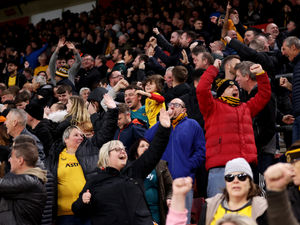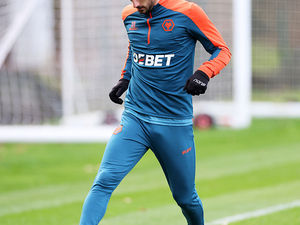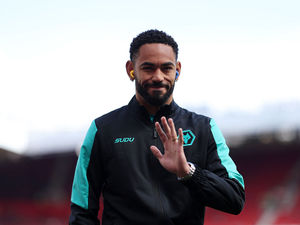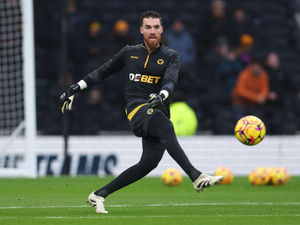Wolves in good health thanks to injury record
There are many things that spring to mind when discussing what's made the season so far a success for Wolves.
A solid defence (only five teams have conceded fewer), the goals (seven) and assists (six) of Raul Jimenez. some midfield sorcery from Joao Moutinho and Ruben Neves and of course the consistently sage management of Nuno Espirito Santo would all be worthy examples.
But an impressive lack of injuries should also be high on the list.
Wolves currently have a clean bill of health – only the suspended Willy Boly missed out against Leicester on Saturday – and it's been a key factor behind their adaption to Premier League life.
This isn't the only time during 2018/19 they've had no injuries on their book. Compare that with Newcastle, who currently have 10 players in the treatment room, or West Ham who have nine.
Freelance injury data analyst Ben Dinnery (@BenDinnery) highlighted just how good Wolves' lack of injuries compares to the rest of the Premier League with this table...
Just three seasons ago, in 2015/16, Wolves' injury woes were nothing short of horrendous. They suffered three cruciate knee ligament injuries – and 10 players missed at least a month or longer through injury absences.
This season that number is just one, namely Ivan Cavaleiro who began the campaign with a troublesome back problem.
Even when Jonny Castro Otto was sidelined for up to six weeks with a knee injury picked up on international duty, he returned inside a month (Diogo Jota, with separate hamstring and quad problems, makes up the rest of Wolves' injury total).
And that's no coincidence.
Wolves have invested time and money in overhauling their methods when it comes to conditioning, strength, fitness and, yes, injury prevention.
We saw last season how that investment – and new ideas from Nuno's backroom team – paid instant dividends in terms of Wolves' injury record, which hardly affected them during a gruelling 46-game campaign.
Head of medical Phil Hayward, now in his 11th season at the club, explained in a recent interview with BBC Radio that it's very much a team effort alongside the sport science department.
Of injury prevention, he revealed that the work kicks off at the very start of the summer.
"It starts at the beginning of pre-season," he said
"We’ll do a full screen of all the players alongside the sports science guys and we’ll get a really clear picture of how each player moves and what happens at each of their different joints.
"We’ll assess their biomechanics and then according to that we’ll have an idea in terms of areas which may be more exposed to potential injuries.
"We’ll then put a programme in place to try and prevent those injuries.
"Each day they’ll have a particular focus for that, to make sure that any things that have been identified during that screen process are addressed, so that those parts of the body are optimised for performance."
Expertise and experience from the likes of Hayward and club doc, Dr Matthew Perry, has been married with Nuno's trusted backroom team – and the results have been outstanding.
Fitness and conditioning coach Antonio Dias said: "It’s been fantastic, because for Nuno as a coach it’s always been of massive importance, the medical department and the way we work together in terms of injury prevention or keeping the players healthy.
"To come here and get people that were completely open to engage with what we thought, open to share and discuss and go for a combined approach, from day one they have been buying in to what we’ve brought."
Everything seems to be covered, from eye-related performance to daily urine samples to check for dehydration (which are then followed by individualised drinks based on sodium and sweat-rate tests in pre-season to top up the right levels).
And it's all done at the ever-ramped Compton Park, where the facilities are second to none.
Strength and conditioning coach Rich Kirby says it's the small percentages that can make a big impact when it comes to Saturday afternoon.
"In the performance suite is where we get data analysis for the lads, their hydration scores mainly," he said.
"We're checking if they’re fuelling their body adequately for the training sessions and the demands for the week ahead.
"We're also looking at the nutrition and supplementation side, looking at allowing their bodies to be in the best physical condition through what they eat and what they put into their bodies to ensure the vision Nuno and Antonio have for the lads physically, they can achieve.
"We analyse urine samples every morning and feed back to the players whether their scores are adequate or they need to improve.
"Then we supply them with individualised drinks based on sodium and sweat-rate testing that’s done in pre-season.
"A lot of research suggests dehydration in particular can give not just mental discrepancies in terms of their performance but also physical fatigue and power outputs are decreased as well.
"In a sport like football having small discrepancies can have big impacts on the pitch."
With Wolves having a small first-team squad by Premier League levels (they may have no injuries but Boly’s absence on Saturday meant untried under-23 youngster Ryan Giles was on the bench), keeping injuries to a minimum for the rest of the season is vital.
Indeed, it may be just as important as a big January signing.





